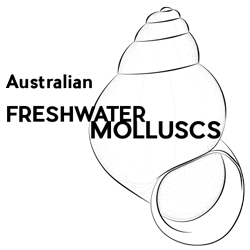
Species included in the B. bellii group are small to medium-sized (2.3-3.0 mm in length), ovate-conic to ovate and usually have a columella swelling. The penis is simple (as in B. bellii and B protuberata) or with a lenticular brown gland in the middle. Species in this group are restricted to north-western Tasmania.
Differs from other related species Beddomeia mesibovi, B. topsiae, B. gibba and B. fultoni [1] [2][1] [2] in the male genital system having small (not large) lobes on the concave medial edge of the penis and the prostate gland extends less (about 1/3) into the pallial roof.
Beddomeia salmonis Ponder & Clark, 1993
Class Gastropoda
Infraclass Caenogastropoda
Order Littorinida
Suborder Rissoidina
Superfamily Truncatelloidea
Family Beddomeiidae
Original name: Beddomeia salmonis Ponder & Clark, 1993. In Ponder, W.F., Clark, G.A., Miller, A.C. & Toluzzi, A. (1993). On a major radiation of freshwater snails in Tasmania and eastern Victoria: a preliminary overview of the Beddomeia group (Mollusca: Gastropoda: Hydrobiidae). Invertebrate Taxonomy 7: 501-750.
Type locality: Small tributary of Salmon River at junction of Salmon Rd, and Lerunna Rd, Tasmania.
On wood in streams. Egg capsules atypical of Beddomeia, with flattened dorsal surface. Contain a single egg. Development direct.
This species is only known from the Salmon River, Tasmania.
All species of Beddomeia are geographically isolated and have restricted ranges.
This species is on the Tasmanian Threatened Species Protection Act 1995 as Rare (small population at risk).
Ponder, W. F., Clark, G. A., Miller, A. C. & Toluzzi, A. (1993). On a major radiation of freshwater snails in Tasmania and eastern Victoria: a preliminary overview of the Beddomeia group (Mollusca: Gastropoda: Hydrobiidae). Invertebrate Taxonomy 7: 501-750.